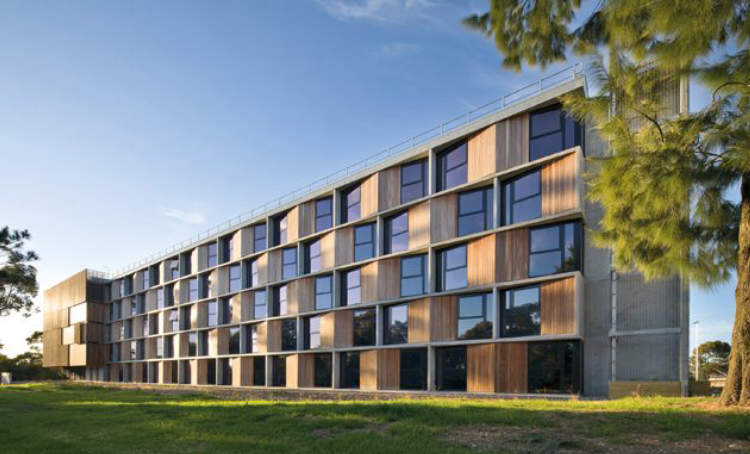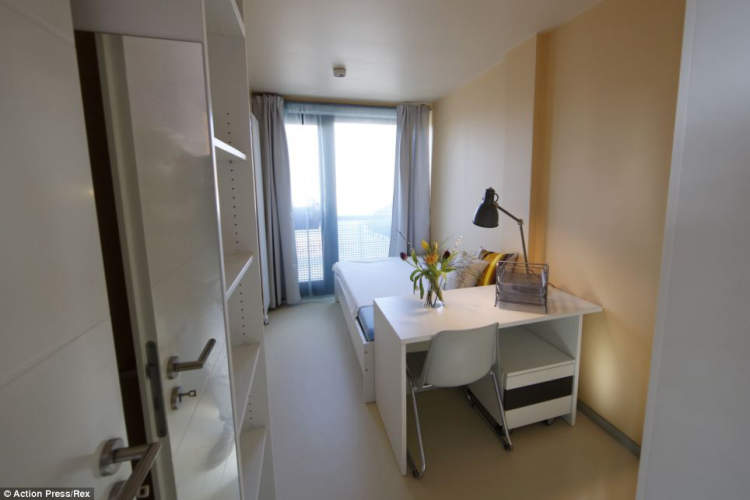Germany is one of the most interesting countries in Europe for international students. With charming cities, a strong academic tradition, and ample accommodation options, it is no wonder that more and more students are choosing to study in Germany. But before packing up your bags, here are 10 student accommodation tips for easy living in Germany.
Living in Germany can be daunting at first, but it does not have to be. By following these tips, students can make the most of their student accommodation and have a truly fulfilling and enjoyable experience studying in Germany.
Required Documentation
Finding accommodation is a necessary step for international students in Germany. To secure a room you will be required to present certain documents. Before you can start looking for a place it is important to make sure that all documentation is ready.
In particular, you must able to provide the following documents:
- Proof of health insurance coverage
- Rental agreement form, also known as Mietbestätigung
- A valid passport or identity card
- Proof of income (Anmeldung)
- Proof of enrollment
- Proof of identification such as a driver’s license
- Bank details including international Bank Account Number/ IBAN
- Certificate of university language course
It is advised to keep copies of these documents both in digital and physical formats. If you are new to finding accommodation, some universities offer support services and useful advice such as current rental prices in the area and what to look out for in the rental agreement.
Finding Student Housing

Finding student housing in Germany can be challenging. You have to consider factors like cost, location, availability, and amenities before making a decision. Fortunately, with the right preparation and research, you can make the process much smoother.
Here are some tips to help you find student accommodation in Germany:
- Start your search early. The best accommodation options tend to get taken quickly, so it’s important to start your search several months in advance.
- Identify budget-friendly options. Student housing can be expensive, but with careful research, you can find affordable options.
- Check out student housing options in the area. Many universities have student housing available near the campus which you can explore.
- Take advantage of online resources. Online rental websites and classified ads can be helpful when looking for a place to stay.
- Consider hosts or roommates. Private hosts or roommates can provide a cost-effective solution to student housing in Germany.
- Visit potential housing options in person. Seeing a property before you rent it is a must. So try to schedule an appointment to view the place before signing the lease.
- Read the contract carefully. Make sure you understand the terms of the lease before you make a commitment.
- Know your rights. Familiarize yourself with the German tenant rights, so you can ensure that your interests are being protected.
- Understand the local culture. Knowing the culture of the area can help you make better housing decisions.
- Network. Connecting with other students or locals could provide some valuable insights that could help you on your search for student accommodation in Germany.
Finding student housing in Germany can seem daunting. But armed with the right knowledge and resources, you can make the process much easier. With these 10 student accommodation tips for easy living in Germany, you’re sure to find an affordable and suitable option in no time.
Arranging Income-Based Rent
If you are a student and planning to rent an accommodation in Germany, one of the best advice you can do is to consider arranging a student-friendly income-based rent. This can help you pay less for rent and save more money for other expenses in Germany. There are some steps you can take to make this work.
Steps to Arrange Income-Based Rent in Germany
- Check and research on income-based rent options available in Germany.
- Compare the costs of different student-friendly accommodations available.
- Negotiate on the rent to see if you can get a cheaper rate with the same facilities.
- Prepare the necessary documents and documents required to process the income-based rent requests.
- Finally, always check the contract and terms before signing it.
Income-based rent is an excellent way to arrange student-friendly accommodation in Germany and it should always be taken into consideration when looking for a place to live. Hopefully, these tips can help you find the right one.
Registering in the Local Office
Registering in the local office is required for all foreigners who plan to stay in Germany for more than three months. You will need to register with the local authorities for a residence permit. This can be done at the Registration Office (Einwohnermeldeamt) or at the Foreigners Registration Office (Ausländerbehörde).
Here are the steps you need to take to register in the local office:
- Request a registration certificate from your local council (e.g. Bürgeramt).
- Go to the registration office (Einwohnermeldeamt) with your registration certificate and two passport photos.
- Fill in the registration form and submit it to the amt (office).
- The amt will review your form and issue a residence permit.
Once you have registered in the local office, you will have access to public services such as healthcare. You should note that you must renew your residence permit every couple of years.
Looking for ‘Studying Contracts’
When choosing student accommodation in Germany, it is important to consider a few things. There are a variety of contracts for student accommodation that students can explore, and each offer a range of advantages and disadvantages. ‘Studying Contracts’ are a kind of agreement that may be beneficial for certain students, so let’s look at what they entail:
What is a Studying Contract?
A ‘Studying Contract’ is a legal agreement between a student and their landlord. As part of the agreement, the student agrees to pay rent for their accommodation and also for any extras that may be necessary (e.g. furniture, internet etc.). In return, the landlord agrees to provide the student with a secure and well-maintained living space. Additionally, the landlord must provide heating and hot water and make any repairs as needed. The term of the contract usually ranges from twelve to eighteen months.
Advantages of the Studying Contract
- The ‘Studying Contract’ guarantees the student a secure living space for the length of the agreement.
- The landlord will usually provide the student with a discount on the rent if the student needs to extend their stay beyond the original agreement.
- The agreement is a legally binding document that protects both the student and the landlord, so if either party fails to meet their obligations, the other party can take legal action.
Disadvantages of the Studying Contract
- The cost of renting with a ‘Studying Contract’ is usually higher than renting without one.
- The student is expected to pay rent for the entire duration of the agreement, even if they decide to leave earlier than planned.
- The ‘Studying Contract’ may not provide any protection if the landlord fails to provide the services outlined in the contract.
Understanding German Lease Agreements
Renting a place to live in Germany can be an intimidating process, especially for international students. The paperwork is usually comprehensive and the terminology can be intimidating. It is important to understand the terms of the lease agreement before signing so that there are no surprises. Here is a brief overview of the common elements of German lease agreements.
Rent and Other Costs
Rent and other applicable fees and charges should be specified clearly in the lease agreement. These charges may include water and electricity charges, or other utilities. The student or tenant should make sure that these costs are all taken into consideration before signing the contract.
Duration of Agreement and Termination
The duration of the rental agreement, as well as the conditions of termination, should be included in the lease agreement. It is important to understand these conditions and any applicable fines so that there are no surprises in the event that the student or tenant needs to leave the property before the end of the lease.
Security Deposit
Most landlords in Germany will require a security deposit to be paid at the start of the lease. This is a sum of money that is to be held by the landlord until the tenant has vacated the property and fulfilled all of the conditions in the contract. Generally, the security deposit will be equal to one or two months of rent.
Living Conditions and Rules
The conditions of living in the property may be specified in the lease agreement. This may include rules for quiet hours, pets, or other tenants. It is important to understand these conditions before signing the agreement.
Maintenance and Repairs
The lease agreement should specify which party is responsible for the maintenance and repair of the property, as well as any applicable costs. The tenant should make sure that they understand this aspect of the agreement before signing.
Insurance
The tenant should also be aware of any applicable insurance that they are expected to carry. This may include contents insurance, or liability insurance. These costs should be taken into consideration when comparing properties.
7. Getting to Know Neighbours
If you are living in student housing in Germany, it’s important to take some time and get to know your neighbours. After all, you’ll be spending your time around them, so it’s important you understand each other’s habits. Not only will getting to know your neighbours help foster relationships and happiness, but it can also help create a feeling of safety.
Here are some tips on getting to know your neighbours in Germany:
- Introduce yourself. Reach out to your neighbours and introduce yourself. Smile, offer a handshake, and take the opportunity to chat about any shared interests you may have.
- Be friendly. If your neighbours wave or nod a hello, be sure to reciprocate with your own warm welcome. It’ll start the conversation off on the right foot.
- Attend social events. A great way to get to know other tenants is to attend community events. Sign up for notifications from the student housing to make sure you never miss an event or special invitation.
- Be considerate. Make sure you adhere to community rules and respect noise regulations. As your neighbours get to know you, they’ll be more likely to appreciate you if you’re being thoughtful and considerate.
Getting to know your neighbours is a great way to build relationships and establish understanding and security. Keep these tips in mind when you’re living in student accommodation in Germany to ensure your best experience.
8. Living with a Roommate
Living with a roommate can be a great way to optimize living costs and help you get used to life in Germany. However, it is important to discuss some of the key aspects prior to making a decision; this includes the split of rent, joint bills/utilities, food items, limits and privileges.
To make the most out of being a roommate in Germany, here are some tips to consider:
- Discuss the type of living environment each of you want to create, such as cleanliness, how loud you can be, and guest policies.
- Create a roster for daily house chores and decide who is responsible for each.
- Establish boundaries for food items and other goods that one might share with the other.
- Establish the rules regarding visitors, ensuring the other agrees to them and respects them.
- Create a contributor list to share bills and divide rent payments.
Living with a roommate can be an amazing experience if the relationship is managed well. It requires mutual respect and communication, as well as learning to share and compromising for the benefit of both parties.
Enhancing Home Security
Living alone in a foreign country can be daunting for students, especially those staying in off-campus student accommodation. To ensure that they feel safe and secure, it is important for them to take extra measures to ensure their home security. Here are some tips for enhancing home security:
1. Invest in a smart doorbell and camera system
A smart doorbell and camera system that is connected to the door lock will be able to recognize every visitor and provide an additional level of security. This system can also alert the occupant via text message or email whenever a visitor arrives, so he or she can take necessary precautions.
2. Install additional window locks
Window locks are an often-overlooked form of home security. Installing additional locks to windows can add an extra layer of security to a student living space. The locks should be sturdy and should be regularly inspected for any signs of damage or wear.
3. Use motion-sensor lights
Using motion-sensor lights outside the house can deter intruders and also help the student to keep track of who is coming and going outside his or her accommodation. The lights should be set up facing the entrance to the property and should be checked regularly to ensure that they are working properly.
4. Use a safe for valuables
A safe is the best way to keep valuable items such as jewellery, documents or money secure. Safes come in various sizes and can be installed in a discrete location. The safe should be securely fastened to the wall or floor, and the combination code should not be shared with anyone.
5. Secure doors and windows with locks
Installing sturdy safety locks on external doors and windows is the best way to keep intruders out. It is important to check the locks regularly to make sure they are in good working order. Windows and doors should also be kept locked at all times to prevent unauthorised entry.
6. Keep track of property inventory
It is important for students to keep a regular inventory of their belongings. This inventory can be kept in the form of a list or even a photograph for easy reference. This will help students keep track of their valuables and will make it easier to recover any items that are stolen.
7. Install a Security System
A security system can be a great way to deter unwanted visitors. Installing a security system with alarms and cameras can help to provide an added level of security. The system should be monitored regularly and should be kept up to date with the latest software and hardware updates.
8. Consider Moving to a More Secure Neighborhood
If a student is living in an area where crime is more prevalent, they may want to consider moving to a safer neighborhood. Living in an area with low crime rates can give students a greater sense of security and help ease any worries.
9. Have an Emergency Plan
It is important for students to have an emergency plan in place that can be followed in the event of an emergency. Having a plan and knowing what to do in case of an emergency can help to ensure that the student is kept safe and secure.
By keeping these tips in mind, students can ensure the safety and security of their student accommodation in Germany. Taking the extra time to prepare and take precautions can help students to enjoy their stay in the country and have an easy and memorable living experience.
Taking Advantage of Grants and Scholarships
One of the most important tips for student accommodation in Germany is to take advantage of grants and scholarships available to international students. Living in Germany can be expensive, so stretching your budget with scholarships and grants can help make your time abroad more enjoyable.
When applying for grants or scholarships, you’ll need to make sure that you meet the basic eligibility requirements. Most grants and scholarships require that the applicant be either a foreign student studying in Germany or a German student studying abroad. Some grants and scholarships also requires a high GPA while others require financial need. Therefore, it’s important to read the requirements for each grant or scholarship you are applying for.
Once you have met the eligibility criteria, there are several ways to find grants and scholarships available for international students. The best place to start your search is the German government website. The website provides information on various grants and scholarships available for international students as well as information on how to apply. You can also search for grants and scholarships in online databases such as the Education Information System (EIS), The German Academic Exchange Service (DAAD), and the German International Education Award (GIEA).
Another great source of grants and scholarships is your host university. Each university will provide information on grants and scholarships specifically for students attending their institution. You can also contact the university’s international office for more information. Also, don’t forget to reach out to your own home country’s government and ask about their funding programs for international students.
In addition, there are some private organizations that offer scholarships and grants for international students. For instance, the German Academic Exchange Service (DAAD) offers various scholarships and grants for international students studying in Germany. They also offer language courses and other services for international students.
Finally, you can consider applying for scholarships from non-governmental organizations. Organizations such as Rotary and the American Association of University Women (AAUW) to name just a few, that offer scholarship opportunities for students abroad. These organizations have their own eligibility criteria and application process, so it’s important to read these carefully.
By taking advantage of the grants and scholarships available, you can make finding student accommodation in Germany easier and more affordable. Whether you’re a foreign student studying in Germany or a German student studying abroad, exploring the grants and scholarships available to you is a great way to make your stay more enjoyable.
Conclusion
Finding suitable student accommodation in Germany is a tough process, but with the right tips, you can make the process easier. Going through reputable agencies, making sure to ask questions and knowing what your options are are all important pieces of information for making the right housing decision in Germany. Also important is getting to know the local culture and making sure to research the area. Above all, it is important to remain flexible and try to find a space that best suits your needs and lifestyle.
Living in Germany is not always easy, but with these 10 student accommodation tips, you can make the process of finding the right home a great deal easier. Whether you are a student looking for a place to stay, planning a long-term stay or just visiting, these tips can help you find the right accommodation for you. Enjoy your stay in Germany!




